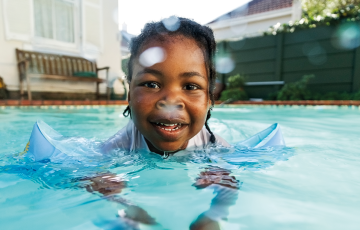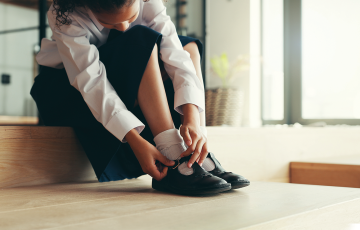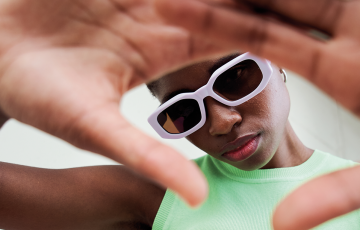Stories of hope as told by cancer survivors
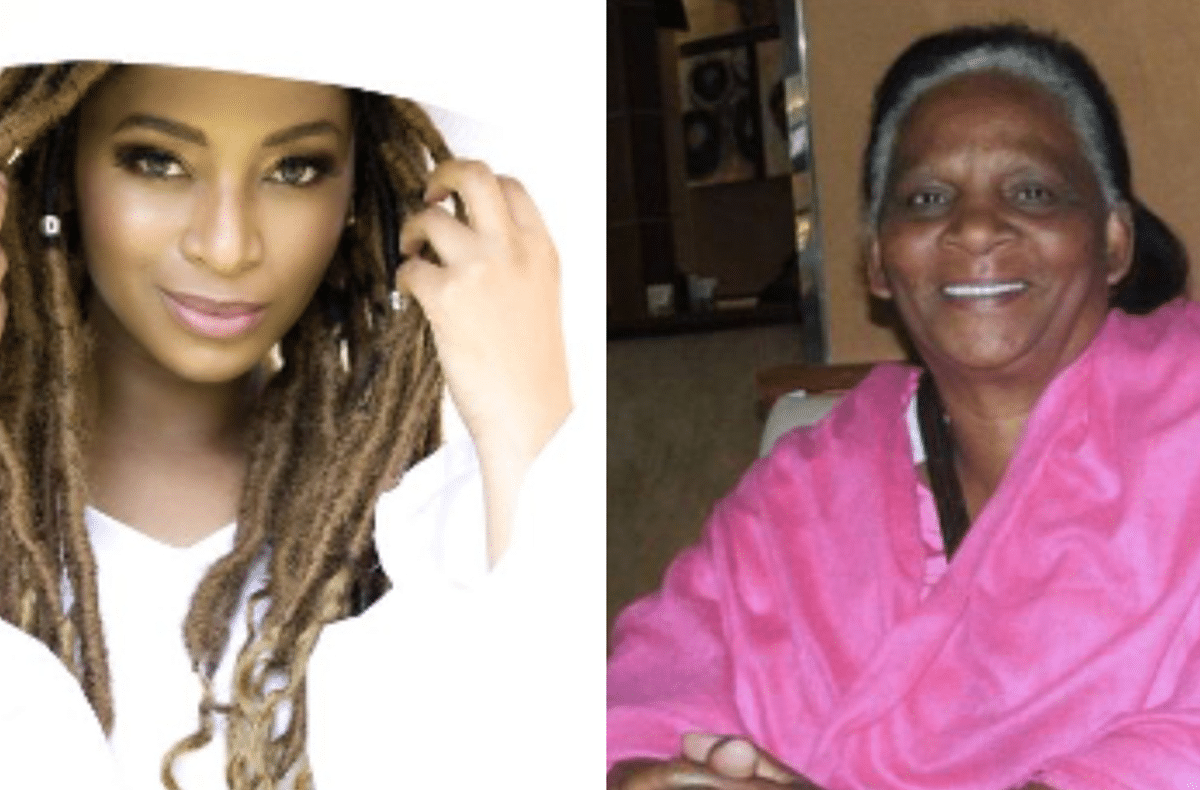
Naniki Seboni shares her story of overcoming a malignant melanoma at 25

It was a lapse in judgment that had me believe that skin cancer was a disease exclusive to people with lighter skin tones. Never had I heard of a darker skin toned person getting skin cancer. For the better part of my childhood, I had the understanding that I had sensitive skin, though the cause of that sensitivity was unbeknownst to my parents and I. However, when I was outdoors playing, that sensitivity would rear it’s ugly head.
As a kid in school I played a great deal of sports, from soccer to netball, swimming to athletics and more. My school bag was always full of water bottles, a cap, a bottle of sunblock and of course my boring books. My friends never understood why I carried sunblock. They jokingly said I just wanted to stay light skinned, but it was really because I burnt so quickly, 15 minutes was more than enough sun exposure for me! My skin and the sun had and still have a love-hate relationship. I made an effort to protect myself, but every so often I would get sunburnt. I wish someone had explained to me then that if you experience 4+ serve sunburns in childhood, you run the risk of getting skin cancer as an adult. I would’ve gone for check-ups back then, if I’d known.
Come 2015, two weeks before my 25th birthday, I was diagnosed with Stage III malignant melanoma. My melanoma was found on the lateral side of my left leg, and what I thought was a beauty spot or mole, had ultimately grown four times the size and had an irregular shape. The mere sight of it made me uneasy. Two years earlier, I hit it against the coffee table and the searing pain crippled me for over 15 minutes. The blood on the carpet was outstanding for such a small mole! I screamed, yelled and cried in pain. Annoyed by the shame and pain the black mole brought me, I thought I could use a razor and cut the mole off. Ever heard of bad ideas? Well that was one of my worst bad ideas. After my self-surgery, the mole doubled in size and looked like a huge fly on my leg!
A regular hospital check-up two years on, turned my life upside-down, with my melanoma diagnosis. My immediate thoughts were death.
I was alone in the room with two doctors. I was making jokes, only because it was my best coping mechanism in the moment. I was extremely unnerved. What in the world did it mean to have skin cancer? I was facing my own mortality at such a young age. I thought that was it, I had to write a Will and I would be laid to rest one to three years after my father’s passing. My mother would be left alone.
To be honest, I can’t recall what my doctors said to me. My mind had checked out. I walked outside and called my partner. As soon as he arrived, I lost it. I curled up in a ball in the backseat of the car and cried my heart out. I couldn’t even drive myself home. So I left my car at the hospital. I had never been so frightened in my life. It turns out my doctors had said they could operate and remove the cancer. In the beginning I went in religiously for my check-ups; determined to get rid of the cancer. But my rational self, was overwhelmed by my overly dramatic self, which resulted in me boycotting my remaining follow-ups. I was too scared. I woke up, got dressed, hit the highway and halfway there I would turn and go home. I was afraid of the unknown. The doctors clearly said they could help me, but at that point all I could think of was the absolute worst.
I found support and encouragement from the members of CANSA’s Champions of Hope Facebook Group for cancer Survivors & Caregivers, and I set a new appointment for the following Monday. Right there, on the spot, I was to be admitted. It happened so quickly and I was so overwhelmed that I left, and returned on Tuesday for admission. On Wednesday I underwent a surgical removal of the cancer and by Friday I discharged myself. I didn’t want to be in hospital for one more second!
My battle with cancer was more psychological than it was physical. Stigmas and misinformation clouded my mind and held me back from beating cancer with one clean swoop. Once I was brave enough to stare cancer in the face, I took it down in less than seven days. I thank my doctors at the Steve Biko Academic Hospital for acting so promptly and I don’t know where I would be right now if it wasn’t for my support system. The continuous support I’ve received from CANSA and Lucy Balona (Head of Marketing & Communication CANSA) in particular, is a pivotal part of my victorious cancer journey.
Looking back, my journey was a great lesson in the importance of factual information circulating, which is why it has been my esteemed honour and privilege to work as a cancer awareness advocate and facilitator, educating people about cancer risk factors, but more importantly, showing people that there is life after cancer and hope springs eternal. Today I am wiser and more responsible for my actions, and I say it with conviction that I AM A CANCER SURVIVOR!
Related article: Sun safety tips for your family
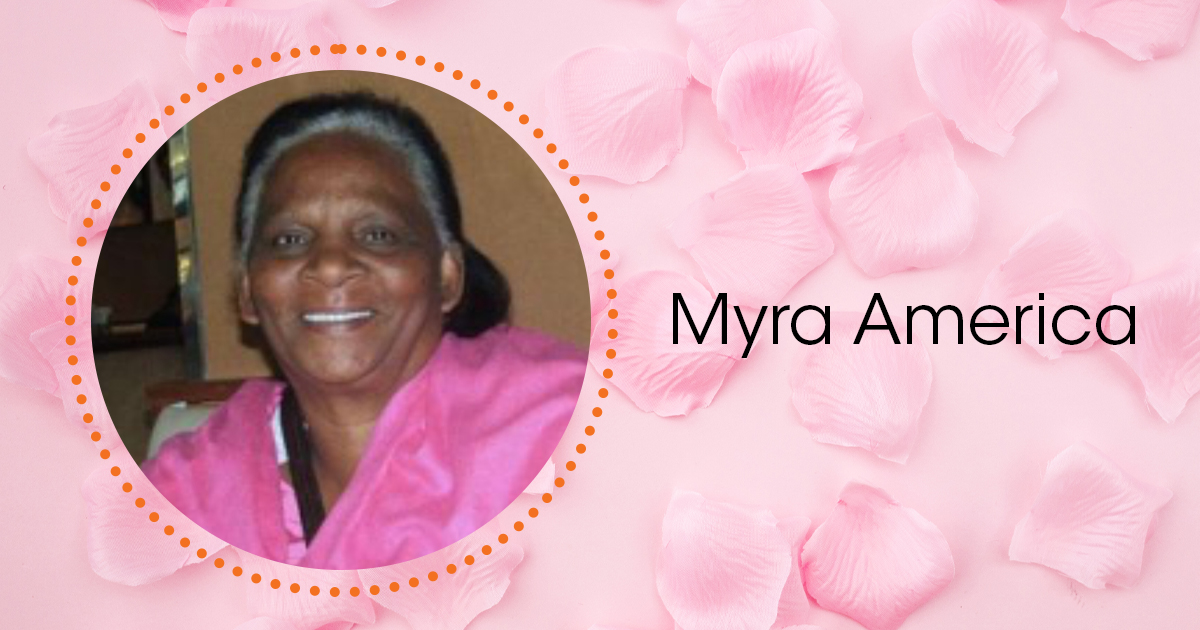
Myra America shares her story of overcoming breast cancer at 62
My story is all too familiar to the countless women who have faced a breast cancer diagnosis. It took two mammograms and several blood tests before doctors finally confirmed that the ‘stretchy’ feeling I felt across my breast was cancer.
I first felt that something was wrong in 2014 but only in 2015 did I decide to get it checked out. I went to a day hospital and got referred to Groote Schuur Hospital for a mammogram. The results came back negative – I did not have cancer. Doctors did another blood test and a biopsy in June, and they too came back negative. But I wasn’t happy, the stretchy feeling was still bugging me. Four days later, I went for more tests and finally, the mammogram and blood tests picked up cancer cells in my left breast. I was told that I had Stage II breast cancer and that my left breast would need to be removed by the following Monday.
I had the mastectomy that week and was prescribed Tamoxifen, a drug used to treat certain types of breast cancer in both women and men. I take the tablet every night and will do so for the next five years. I felt a little depressed about it because when I told everyone about it, they would ask why I never told them sooner. But I had little time between finding out that I had cancer and the operation.
Everyone was shocked and cried more than I did. Dedicating one month a year to cancer awareness is not enough time to reach all those who need to learn about the disease. Those caring for cancer patients also need to consider that those with the illness are on a journey and not all of them will deal with it in the same way. Some people will heal quickly and others won’t, but it is an emotional journey and people need support.
Related article: Coping with the big C
I now volunteer at CANSA and visit cancer patients in their homes to offer support. I explain to them that I also had cancer and that they are not alone on this road. I urge anyone who detects a problem with their breasts, or anything irregular for that matter, to get tested. Even if you feel a lump and think it’s nothing, get it examined anyway. Not everyone may have the patience to sit at the hospital all day but that one day could save your life. You may feel scared to go, but you shouldn’t. Cancer is just a name, it is not a death penalty. It comes with some changes, but ultimately it makes you slow down in life and appreciate your health. You realise how much support you truly have and how your family is brought together.
Related article: Beat the odds of the big C
Get in touch with Cancer Association of South Africa (CANSA)
Email: info@cansa.org.za Help Desk: 0800 22 66 22
(toll free)
WhatsApp: 072 197 9305 (English and Afrikaans)
WhatsApp: 071 867 3530 (isiXhosa, isiZulu, siSwati, Sesotho and Setswana )
Follow on Twitter, Facebook, Instagram, LinkedIn
Related articles

Latest Jet club magazine
We’ve got the latest trends, exciting prizes and exclusive savings just for you!
Jet Club will not pass your details to anyone else. By clicking the subscribe button you confirm you have read and agree to the Jet Club Terms and conditions and Jet Club Privacy Statement.
Subscribe